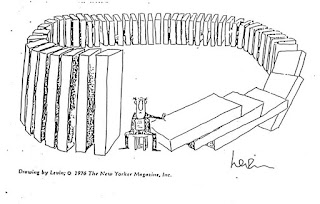Why Do Smart Managers Make Bad Decisions?
That explains
why so many well-intentioned personal decisions, government policies and
business strategies backfire and produce counter-intuitive and unintended
consequences. History and management books are fraught with such examples: use of cheaper drugs pushes costs up, not
down; building roads to reduce congestion increase traffic, delays, and
pollution; antibiotics have accelerated the evolution of drug resistant bacteria
and viruses; pesticides and herbicides have increased the spread of pests and
weeds, and have killed off their natural predators.
Business and corporate report card is no
better. A major study by Shell Oil of Fortune 500 companies revealed “most
corporations are dramatic failures; [they] develop and exploit only a fraction
of their potential and die prematurely at an average age fewer than 40 years… There
is accumulating evidence that corporations fail because the prevailing thinking
and language of management are too narrowly based on the prevailing thinking
and language of economics”.[2]
I can think
of two key (there are more) reasons for why smart leaders make bad decisions. First, is the lack of understanding and
appreciation of complexity (the whole system) – they simply don’t have the
right tools. This is not surprising, as the great majority of today’s leaders
have been trained in schools where the dominant mode of education is linear and
reductionist (i.e., divide and conquer) – with the concomitant illusion of
power, predictability, and control. John Sterman, Director of Systems Thinking
at MIT, sums this up: “Thoughtful leaders increasingly suspect that the tools
they have been using have not only failed to solve the persistent problems they
face, but may in fact be causing them.”[3]
[1] Lewis Thomas, The Medusa and the
Snail: More Notes of a Biology Watcher (New York, NY: Viking Press, 1979), p.
90.
[2] Arie de Geus, The
Living Company, Harvard Business School Press, Boston, Mass 1997
[3] Sterman, J. (2001), “System Dynamics Modeling: Tools
for Learning in a Complex World”, California Management Review, Vol. 43, No. 4.




Comments
Post a Comment